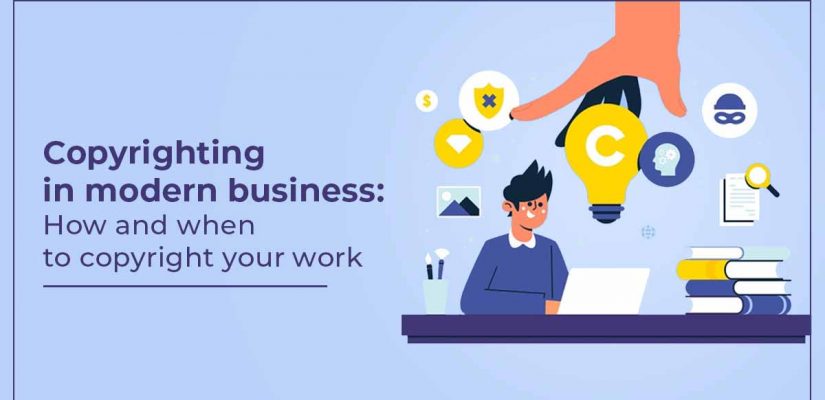
Copyrighting in modern business: How and when should you copyright your work
In modern business, various devoted and savvy company owners understand the importance of intellectual property (IP) for the success of their company and end up naming patents, trademarks, and copyrights. These are some of the diverse variations which Intellectual property (IP) can present. But the differences between copyrights, patents, and trademarks, even for business people who regularly deal with IP, are often confusing and misunderstood. Let us elaborate and look into the details.
What Is a Copyright?
As we address the legal discussion of what a copyright means, stay put. A copyright is a type of legal security that is set in a tangible medium of speech for original works of authorship. This is a rather technical legal term that effectively suggests that a copyright only applies to original works (although originality is subject to its own tests) that are capable of being covered by and somehow registered. So there should be no copyright for a song or tune that has only been sung or performed but has never been registered in musical sheets, or an audio or video recording. But don’t restrict your imagination to believe only creative works that we associate with popular artists and Hollywood-in traditional business contexts, copyright still has a significant role.
Why is a Copyright essential in modern Business?
It is important to secure and manage the intellectual property as a business develops its position in the industry, since it may be the difference between success or loss. Companies would also start recognizing the diverse kinds of intellectual property such as copyright, patent, and trademark. Some of these involve a systematic procedure of submission and examination before the correct one can be registered. Some come without the need for a registration process, but in the longer run, having one will only work in your favor. One of the important and often forgotten aspects of IPR is copyright.
Benefits of copyright registration
- Ownership
A copyrighted work may be used exclusively by the copyright holder. All must seek permission from the owner to use a copyrighted piece. In order to obtain money from their work, authors, musicians, performers, and others also license their copyrighted works. There are certain variations under certain circumstances, such as the legal theory of ‘fair use which provides for brief extracts from works.
- Longevity
New preservation of copyright lasts for 70 years after the death of the author, which is significantly longer than past legal updates.
- Penalties
The Copyright Act lays down monetary penalties for breaching the patented work of another, that is, using it without permission. Fines vary, but they can be substantial and are based on a court ruling that cash penalties, lack of sales, attorney costs, etc are incurred by the copyright owner.
- Clarity
In difficult situations, the law gives some insight into copyright ownership. For company owners, the manufacturing of hire work is more significant. When an employee makes a brochure or website for the company for example, the copyright is typically held by the company rather than the individual employee. Since ownership is not always entirely clear (contract works can be complex), defining copyright rights is helpful with any contract you enter into with creative works.
A license agreement should be signed in a due form where a third party is entitled to use or reuse protected works (for example, a designer to which the author gives the right to create and sell design products).
Conclusion-
Copyrights are important for business but often underutilized method for protecting the corporate land. Nearly everyone is aware that books, movies, and music are protected by copyrights. Many business persons can however be unaware that copyrights also protect both domestic and international electronic networks, files, blogs, schedules, newsletters, instructional videos, guides, technical articles, files, architectural and technical pieces, and marketing content. Legal way LLP is a leading company that helps reputable companies with various business solutions. For more details on how to grow your business, connect with us.